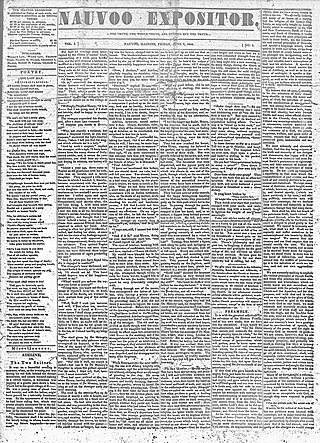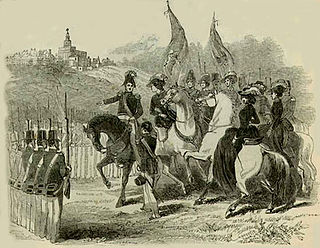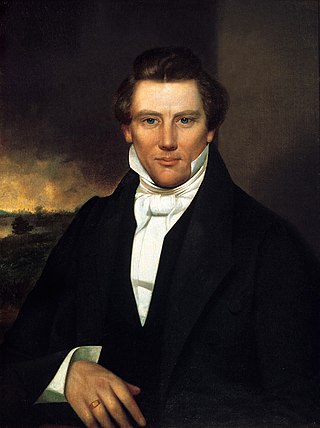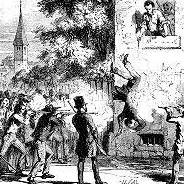This article needs additional citations for verification .(October 2013) |
The Municipal Court of Nauvoo was the judicial body of Nauvoo, Illinois from 1840 until 1845.
This article needs additional citations for verification .(October 2013) |
The Municipal Court of Nauvoo was the judicial body of Nauvoo, Illinois from 1840 until 1845.
The Nauvoo City Charter was passed by the Illinois Legislature on December 16, 1840. The legislature mandated that "The Municipal Court shall sit on the first Monday of every month, and the City Council at such times and place as may be prescribed by city ordinance; special meetings of which may at any time be called by the Mayor or any two Aldermen."
The Municipal Court could hear citizen appeals, with the charter saying: "Appeals may be had from any decision or judgment of said Mayor or Aldermen, arising under the city ordinances, to the Municipal Court under such regulations as may be presented by ordinance;"
The Act stated that the Municipal Court "shall be composed of the Mayor as Chief Justice, and the Aldermen as Associate Justices". According to the charter, "The Municipal Court shall have power to grant writs of habeas corpus in all cases arising under the ordinances of the City Council."
On August 8, 1842, the court released Smith and Rockwell after they were arrested and charged with the attempted assassination of Lilburn Boggs, former Governor of Missouri.
On July 1, 1843, the court intervened in a case against Joseph Smith. The Governor of Missouri issued a writ authorizing the arrest and extradition of Joseph Smith on the charge of treason. The Governor charged Joseph H. Reynolds with arresting and conveying Smith to Daviess County, Missouri. The Municipal Court of Nauvoo dismissed the charges against Smith. [4]
In June 1844, the Circuit Court for Hancock County charged Joseph Smith, Hyrum Smith, and 15 other co-defendants with inciting a "riot" in the destruction of the Nauvoo Expositor. In response, the Municipal Court of Nauvoo dismissed all State charges (despite being a municipal, not state, court). [5]
In January 1845, the legislature repealed the Nauvoo Charter by a vote of 25-14 in the Senate and 75-31 in the House. [6] Nauvoo was dis-incorporated and its assets placed into a receivership.

The Nauvoo Expositor was a newspaper in Nauvoo, Illinois, that published only one issue, on June 7, 1844. Its publication, and the destruction of the printing press ordered by Mayor Joseph Smith and the city council, set off a chain of events that led to Smith's death.

The Nauvoo Legion was a state-authorized militia of the city of Nauvoo, Illinois, United States from February 4, 1841 until January 29, 1845. It was first led by John C. Bennett, and then by Joseph Smith, founder of the Latter Day Saint movement and mayor of Nauvoo. Its main function was the defense of Nauvoo and surrounding Latter Day Saint areas of settlement.

Orson Hyde was a leader in the early Latter Day Saint movement and a member of the first Quorum of the Twelve Apostles. He was the President of the Quorum of the Twelve Apostles of the Church of Jesus Christ of Latter-day Saints from 1847 to 1875 and was a missionary of the LDS Church in the United States, Europe, and the Ottoman Empire.

Willard Richards was an early leader in the Latter Day Saint movement. He served as second counselor to church president Brigham Young in the First Presidency of the Church of Jesus Christ of Latter-day Saints from 1847 until his death.

John Cook Bennett was an American physician and briefly a ranking and influential leader of the Latter Day Saint movement, who acted as mayor of Nauvoo, Illinois, and Major-General of the Nauvoo Legion in the early 1840s.

The life of Joseph Smith from 1839 to 1844, when he was 34–38 years old, covers the period of Smith's life when he lived in Nauvoo, an eventful and highly controversial period of the Latter Day Saint movement. In 1844, after Smith was imprisoned in Carthage, Illinois, he was shot and killed when a mob stormed the jailhouse.

Joseph Smith, the founder and leader of the Latter Day Saint movement, and his brother, Hyrum Smith, were killed by a mob in Carthage, Illinois, United States, on June 27, 1844, while awaiting trial in the town jail.

Thomas Coke Sharp was a prominent opponent of Joseph Smith and the Latter Day Saints in Illinois in the 1840s. Sharp promoted his anti-Mormon views largely through the Warsaw Signal newspaper, of which he was the owner, editor, and publisher. Sharp was one of five defendants tried and acquitted of the murders of Smith and his brother Hyrum.
The history of Nauvoo, Illinois, starts with the Sauk and Meskwaki tribes who frequented the area, on a bend of the Mississippi River in Hancock County, some 53 miles (85 km) north of today's Quincy. They called the area "Quashquema", in honor of the Native American chief who headed a Sauk and Fox settlement numbering nearly 500 lodges. Permanent settlement by non-natives was reportedly begun in 1824 by Captain James White. By 1830, the community was called "Venus", and it was the site of the first post office in the county. In 1834 the name Venus was changed to "Commerce" in anticipation that the town would prosper under the United States' westward expansion.

Edward William Bonney was a 19th-century adventurer, miller, hotel keeper, city planner, counterfeiter, livery stable keeper, bounty hunter, private detective, postmaster, merchant, soldier, and author. He is best known for his undercover work in exposing the "Banditti of the Prairie", resulting from his investigation of the torture-murder of noted Illinois pioneer and frontiersman Colonel George Davenport.
Vinson Knight was an early leader in the Latter Day Saint movement. He served as a counselor in the bishopric in Kirtland, Ohio, from 1835 to 1838, then as bishop in Adam-ondi-Ahman in Daviess County, Missouri, from 1838 to 1839, and finally as bishop of the Lower Ward in Nauvoo, Illinois, having been called by Joseph Smith through revelation to that office in January 1841. Knight served as bishop in Nauvoo until his sudden death at age 38.
James Emmett was an early American Latter Day Saint and for a time claimed to be the rightful successor to Joseph Smith, the founder of the Latter Day Saint movement.

Austin Cowles was a leader and hymnwriter of the early Latter Day Saint movement. Over the course of his life, Cowles, an ardent anti-polygamist, was affiliated with Joseph Smith's Church of Christ, William Law's True Church of Jesus Christ of Latter Day Saints, Sidney Rigdon's Church of Christ, James Strang's Church of Jesus Christ of Latter Day Saints, James C. Brewster's Church of Christ, and Joseph Smith III's Reorganized Church of Jesus Christ of Latter Day Saints.
Wilson Law was an early Latter Day Saint.
Francis Marion Higbee was an early member of the Latter Day Saint movement. He attained the rank of Colonel in the Nauvoo Legion.

Chauncey Lawson Higbee was a member of the Latter Day Saint movement in Nauvoo, Illinois, and a brother to fellow Latter Day Saint Francis M. Higbee.
Charles Ivins was an early member of the Latter Day Saint movement and a publisher of the Nauvoo Expositor.

The Nauvoo City Council was a short-lived municipal body for the City of Nauvoo, Illinois.

Joseph Smith, the founder of the Latter Day Saint movement, was charged with approximately thirty criminal actions during his life, and at least that many financial civil suits. Another source reports that Smith was arrested at least 42 times, including in the states of New York, Ohio, Missouri, and Illinois.
Lucian Rose Foster was a photographer, accountant, bookkeeper, and clerk who was a member of the Latter Day Saint movement.